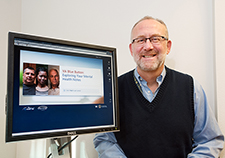Office of Research & Development |
 |

VA Research Currents archive
February 28, 2017

Dr. Steven Dobscha directs the Center to Improve Veteran Involvement in Care, based at the VA Portland Health Care System. His team has been exploring the use of OpenNotes in mental health care. (Photo by Michael Moody)
Podcast: OpenNotes in Mental Health Care Listen, Transcript
Thanks to electronic health records and online portals, more and more patients are being given access to the notes their clinicians write about their health care visits. Research suggests this national movement, known as "OpenNotes," can empower patients and boost communication and shared decision-making. But what about mental health visits? Experts have been unsure whether this area is equally likely to benefit.
Now, a small study from one Veterans Affairs medical center offers insight into the potential for OpenNotes to help—or hurt—patients' trust in their mental health clinicians.
"We found that reading mental health notes may strengthen as well as strain patient-clinician relationships by enhancing or undermining trust," wrote the authors in a report posted online Feb. 1, 2017, in Psychiatric Services.
The study was led by a group from the Center to Improve Veteran Involvement in Care (CIVIC), at the VA Portland Health Care System in Oregon. VA has been studying the benefits and risks of OpenNotes and other pilot features in VA's MyHealtheVet patient portal. VA became one of the first health systems in the nation to offer OpenNotes access, in 2013. Patients access their notes through the Blue Button feature in MyHealtheVet.
"We found that reading mental health notes may strengthen as well as strain patient-clinician relationships by enhancing or undermining trust."
The new study involved interviews with 28 patients. The group included male and female Veterans of various ages, with diagnoses ranging from depression and PTSD to bipolar disorder and schizophrenia. Patients in the study were being treated by psychiatrists, psychologists, and other mental health therapists.
Among the positive themes that emerged in the interviews:
In contrast, there were several elements that provoked dismay among the patients in the study:
With the understanding that the OpenNotes initiative is likely to continue to grow, both in VA and other settings, the study team, including lead author Dr. Risa Cromer and senior author and CIVIC Director Dr. Steven Dobscha, offer several recommendations for mental health clinicians. Summing up, they write:
"Proactive clinician communication with patients about the content of notes and the note-writing process, as well as documenting strengths and highlighting the individuality of patients, may improve the likelihood of maintaining or developing stronger therapeutic alliances between patients and clinicians in the context of OpenNotes."
Dobscha noted in an interview that his team has also developed, and is now evaluating, "web-based courses for both clinicians and Veterans to help them optimize use of OpenNotes in mental health care and minimize any unintended consequences."